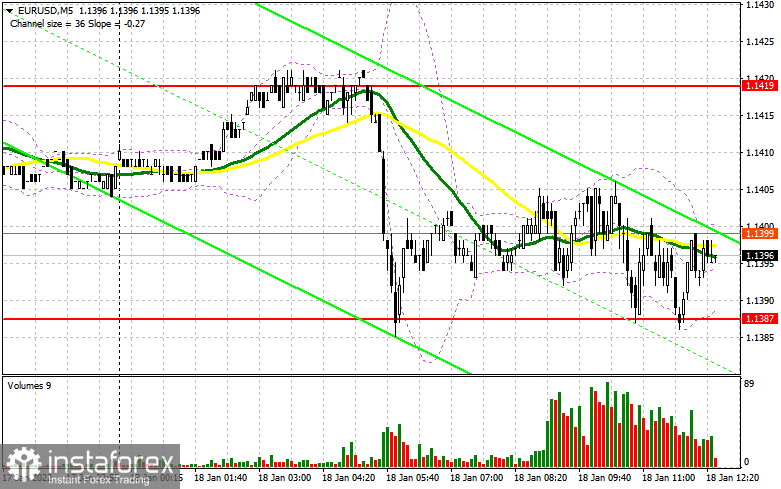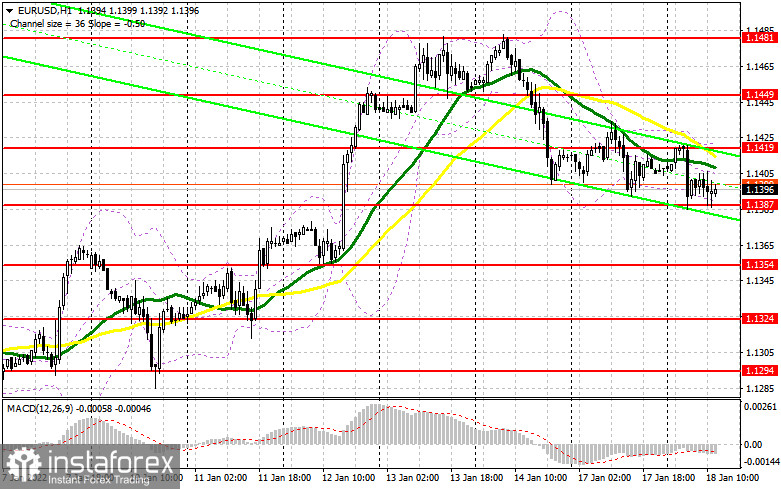To open long positions on EURUSD, you need:
In my morning forecast, I paid attention to the 1.1387 level and recommended making decisions on entering the market from it. Let's look at the 5-minute chart and figure out what happened. The data on the sentiment index in the business circles of Germany and the eurozone supported the buyers of the European currency, which allowed them to protect the support of 1.1387, forming a signal to enter long positions there. However, at the time of writing, there was no major growth and after moving up by 10 points, the bulls lost the initiative. For the second half of the day, the technical picture has not changed, however, it is obvious that the market is gradually falling into the hands of euro sellers. And what were the entry points for the pound this morning?

Until the moment when trading is conducted above the level of 1.1387, we can count on the continuation of the recovery of the European currency. In the case of a decline in the euro in the afternoon, only the formation of a false breakdown at 1.1387, by analogy with the morning entry point, will lead to the formation of a good buy signal, counting on the completion of a downward correction for the pair. But, in addition, an active upward movement of EUR/USD is also necessary, which was not observed in the first half of the day. If nothing happens at the time of the next 1.1387 test, it is better not to rush with long positions.
A break of this channel boundary may lead to a larger sell-off. In this case, I advise buying EUR/USD only after updating the next support of 1.1354, to which the pair may collapse if good data on the Empire Manufacturing manufacturing index and the NAHB housing market index are released. I also advise entering the market there only if a false breakdown is formed. You can immediately open long positions for a rebound from the minimum in the area of 1.1324 with the aim of an upward correction of 15-20 points within the day.
An equally important task for euro buyers will be to return the 1.1419 level under control, just below which the moving averages are playing on the sellers' side. A breakout and consolidation above this range will certainly return the appetite for risks, which will form an excellent entry point for buying EUR/USD with the expectation of a recovery to the next resistance of 1.1449. Going beyond this range will return the bull market and lead to an update of the highs: 1.1481 and 1.1514, where I recommend taking the profits.
To open short positions on EURUSD, you need:
By analogy with yesterday, sellers again waited for the inarticulate actions of buyers, and after the sluggish growth of the euro, even against the background of good fundamental statistics for the eurozone, they dumped the pair to support 1.1387, for which the main struggle will continue today. Of course, the most optimal scenario for selling the euro in the afternoon will be the formation of a false breakdown at 1.1419, where the moving averages are playing on the sellers' side, which forms an excellent entry point into short positions with the prospect of a further decline in EUR/USD to the area of morning support 1.1387.
Strong US data, together with a breakdown and a reverse test from the bottom up of this range, will form an additional signal to enter the market, which will push the pair to a minimum of 1.1354 and open a direct road to 1.1324. A more distant target will be the 1.1294 area, where I recommend fixing the profits. A test of this level will be the end of the bull market seen earlier this year. If the pair recovers during the American session and bears are inactive at the level of 1.1419, the optimal scenario will be sales when a false breakdown is formed in the area of 1.1449. It is possible to open short positions on EUR/USD immediately for a rebound from the highs: 1.1481 and 1.1514 with the aim of a downward correction of 15-20 points.

The COT report (Commitment of Traders) for January 11 recorded an increase in long positions and a reduction in short ones, which led to a change in the negative value of the delta to a positive one. The market is gradually changing and the demand for the European currency, despite the expected changes in the policy of the Federal Reserve System, has not gone away. The US inflation data released last week did not make any impression on traders, as the result almost completely coincided with economists' expectations. Against this background, Federal Reserve Chairman Jerome Powell spoke quite calmly about future interest rates at a time when many traders expected a more aggressive policy from the central bank. Currently, three increases are projected this year and the first of them will occur in March this year. The sharp decline in retail trade in the United States in December of this year also allows the Fed not to force events. Meanwhile, the European Central Bank plans to fully complete its emergency bond purchase program in March this year. However, the regulator is not going to take any other actions aimed at tightening its policy, which limits the upward potential of risky assets. The COT report indicates that long non-commercial positions rose from the level of 199,073 to the level of 204,361, while short non-commercial positions fell from the level of 200,627 to the level of 198,356. This suggests that traders will continue to increase long positions on the euro in order to build an upward trend for the pair. At the end of the week, the total non-commercial net position became positive and amounted to 6005 against -1554. The weekly closing price rose slightly to 1.1330 against 1.1302 a week earlier.
Signals of indicators:
Moving averages
Trading is below the 30 and 50 daily moving averages, which indicates a likely decline in the euro in the afternoon.
Note: The period and prices of moving averages are considered by the author on the hourly chart H1 and differs from the general definition of the classic daily moving averages on the daily chart D1.
Bollinger Bands
A breakthrough of the upper limit of the indicator in the area of 1.1420 will lead to a new wave of euro growth. A breakthrough of the lower limit of the indicator in the area of 1.1385 will increase pressure on the euro.
Description of indicators
- Moving average (moving average determines the current trend by smoothing out volatility and noise). Period 50. The graph is marked in yellow.
- Moving average (moving average determines the current trend by smoothing out volatility and noise). Period 30. The graph is marked in green.
- MACD indicator (Moving Average Convergence / Divergence - moving average convergence/divergence) Fast EMA period 12. Slow EMA period 26. SMA period 9
- Bollinger Bands (Bollinger Bands). Period 20
- Non-profit speculative traders, such as individual traders, hedge funds, and large institutions that use the futures market for speculative purposes and meet certain requirements.
- Long non-commercial positions represent the total long open position of non-commercial traders.
- Short non-commercial positions represent the total short open position of non-commercial traders.
- Total non-commercial net position is the difference between the short and long positions of non-commercial traders.
 English
English 
 Русский
Русский Bahasa Indonesia
Bahasa Indonesia Bahasa Malay
Bahasa Malay ไทย
ไทย Español
Español Deutsch
Deutsch Български
Български Français
Français Tiếng Việt
Tiếng Việt 中文
中文 বাংলা
বাংলা हिन्दी
हिन्दी Čeština
Čeština Українська
Українська Română
Română

